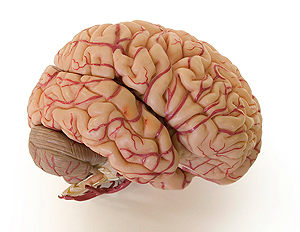
Research by the Health Center’s Dr. Leslie Wolfson and his team has shown for the first time that certain changes in the brain’s white matter are highly predictive of the development of disability in older adults. The results of the study are published in the current edition of the Journal of the American Geriatrics Society.
Wolfson, professor and chair of the Department of Neurology, says mobility is a critical component of independence and quality of life for older persons. Changes involving brain white matter are seen in many MRI brain scans of older adults.
“They are so common that until recently it was assumed they don’t matter and may represent normal aging,” he says. “But our research found that these brain changes are a good indicator of problems in older adults such as difficulty walking, thinking, and remaining continent.”
Wolfson believes that interventions such as aggressive treatment of elevated blood pressure may help prevent or slow these declines, allowing older adults to remain independent, vigorous, and healthy longer.
Wolfson’s research is funded through a NIH National Institute of Aging grant.


